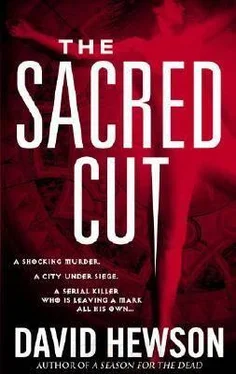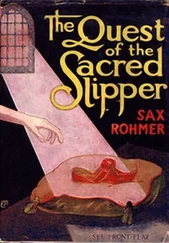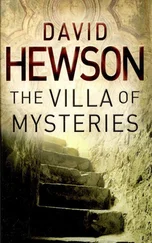He was gesturing. She looked over the river, where a snow-clad circular building rose, brightly illuminated by a forest of spotlights.
“And that is?”
“I told you,” she objected. “It’s only my first time here.”
“Castel Sant” Angelo. Think, Monica. Draw a line from Trinità dei Monti to the castle. Draw another line from the Pantheon, out to the Piazza del Popolo over there. What do you get?“
She looked out to the north, the direction he was pointing, out into the face of the icy breeze, then ducked beneath the trellis and fell into one of the hard, cold summer seats. She got what he was driving at. She wasn’t stupid.
“A cross. A crucifix.”
“And we are?”
“Where the two arms meet? But so what, Peter? Don’t get scary on me. It’s just coincidence. It’s just…”
She looked out over the city, shining under the icy, bright moon, then shivered. “It’s just how things are.”
He walked under the shelter of the awning, stole her glass from the table, took a sip of whisky from it.
“What if there are no coincidences? What if everything has history? A reason?”
He wasn’t serious, she thought. It was just some game. “In a place like this, you could come up with stuff like that anywhere,” she protested. “I could say, look, here’s the Colosseum. Or the Capitol. Or whatever. Look. It makes a circle. A square. An octagon. It’s Rome, for God’s sake. It’s all here.”
“Quite,” he replied.
“You’re sounding like a priest now,” she said softly, slurring the words a little. “I’d forgotten for a while that’s what you are.” She didn’t know what to do. Whether to feel stupid for letting a stranger into her home, into her mind, like this. Or just to roll with it and see where everything went. He was a priest. There was nothing to be scared about.
“Must be hard doing what you do,” she said. “Having to stay apart from other people.”
“There’s nothing hard in that. It helps you think about what really matters.”
“You don’t miss the comfort of another person?”
His smart eyes clouded over. “You can’t miss what you never knew.”
“I don’t believe that, Peter. Not of you.”
Peter O’Malley was not a happy man. He was looking for something, all the time. Why? Monica wondered.
“Why are you a priest? It doesn’t seem right. Whatever would make a man like you do this?”
“A man like me…” He laughed lightly, breaking the fragile spell that had begun to hover around them, something dark at its edges, and she felt relieved, light-headed even. “A man like me is just a fool looking for magic where none exists. And then…”
He waved a hand at the glorious night, the city slumbering under a jewelled sky.
“Then it just sneaks up on you and you realize it was there, in front of you, all along.”
It wasn’t the face of a priest. That was the problem. It was the face of a man of the world, one who’d lived a full and active existence before retreating into this dark shell, the anonymous uniform of the calling.
“Magic,” she muttered, wondering if she would follow where she thought he was leading.
He looked at his watch. Her heart sank. “And a city full of churches, Monica. I’d best find one to pray in, don’t you think?”
AN HOUR AFTER THEY LEFT the embassy, Emily Deacon arrived at the Questura. She’d dressed down for the night: black jacket, black jeans, blonde hair loose around her slim neck. She looked younger, like a student just out of college. And relieved too, Costa thought, to be out of the grip of Agent Leapman, even if being reassigned so abruptly had come as a shock.
She stood in the main office next to Costa’s desk, scanning the room. The night shift were hard at work, making calls, sifting through records on computer screens, reading reports. Falcone had put virtually everyone he had on the job. Some fifty men and women had now begun the task of collating information, trawling through CCTV videos, interviewing the people who lived in the apartments over the shops and restaurants near the Pantheon.
“Are you getting anywhere?” she asked.
Peroni glanced at Costa. Earlier, the two men had demanded a discussion with Falcone, wanting to know exactly how much information they should share with the Americans. It had been inconclusive. Falcone had made a good point: it was ludicrous to belabour the question until they found something worth sharing and that seemed some way off. They already knew the CCTV cameras in the Pantheon had nothing. Those in the streets nearby had captured little but the blizzard. Falcone had shrugged and left it at that, then closeted himself upstairs with Commissario Moretti for a private meeting.
“Early days,” Peroni answered hesitantly. “Can I get you something? A coffee?”
The acute blue eyes looked him up and down. “You don’t trust me. It’s understandable. I’d probably feel the same way if it was me. It’s because I’m American, I guess.”
“No,” Costa told her. “It’s just… a little unusual.”
“You have difficulty dealing with the unusual?” she asked.
“Not at all. It’s just that sometimes it takes a while to adapt. Police departments are like monasteries, really.”
Peroni snorted. A smile flickered on Emily Deacon’s face.
“Monasteries?” she asked, raising a slender fawn eyebrow.
“Really,” Costa protested. “OK, we let in a few women for show. But these are institutions that keep themselves to themselves, rarely share their working practices with others and suspect all outsiders on principle. Big organizations work that way. The FBI’s the same, surely.”
She thought about that. “There are more women.”
“And the rest of it?” Peroni asked.
“Point taken.”
The two men looked at each other. Peroni kicked over a seat and beckoned to her to take it. Then he went off for some coffees.
She looked at the screen. “What’s this?”
“It’s the database we keep on Balkan criminals,” Costa replied. “It just gets bigger by the day.”
“Our guy isn’t Balkan, whatever that means these days.”
“You know that?”
“I know that. I saw the profiling reports. They had some data on where the man had stayed in the US. All phoney names, phoney credit cards. He did it well. We’ve interviewed people who spoke to him. They all gave different descriptions. He’s good at disguise. He’s good with accents. Sometimes American English. Sometimes UK. Australian. South African. He could handle them all.”
“You have a photo-fit?”
It was the obvious question. Her face said as much. “How many do you want? Leapman has included them in the files he’s sent to your boss. We’ve got them coming out of our ears. Every one different. I mean completely different. I told you. He’s good.”
Peroni returned with the drinks. She looked at the stewed brew in the plastic cups and said, “Do you call that coffee? There’s a place near the Pantheon. Tazza d’Oro. If we have time we could go there. That’s coffee.”
Peroni bristled and in very rapid, very colloquial Italian, the kind a couple of street cops would throw at each other in the heat of the moment, protested. “Hey, kid. Don’t throw your toys out of the pram. You’re dealing with a couple of guys who live here. We know Tazza d’Oro. Since when did they start letting Yankees in?”
She didn’t miss a syllable. “Since they found out we tip properly. Where are you from in Tuscany?”
“Near Siena.”
“I can hear it.” She nodded at Costa. “He’s Roman. Middle class. Doesn’t swear enough to be anything else.” Emily Deacon paused. “Am I earning any trust here?”
“Kind of,” Costa conceded. “You didn’t learn that at language college.”
Читать дальше










